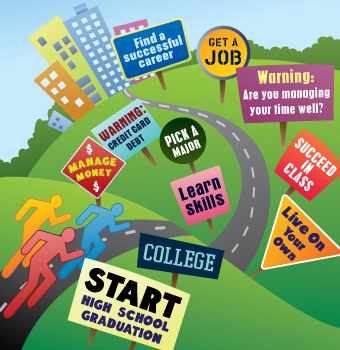Career-Ready is a concept generally applied to:
- students who are considered to be equipped with the knowledge and skills deemed to be essential for success in the modern workforce
- the kinds of educational programs and learning opportunities that lead to improved workforce preparation.
Reform of Career-Ready
- Calls for placing a greater emphasis on “career readiness” in public education are, in general, a response to the perception that many public schools, particularly public high schools, do not pay enough focus to developing the intellectual abilities, practical skills, work habits, and character traits required for success in the workplace or in various professional career paths (many career and technical education programs, however, would be exceptions to this general view).
- In other words, “career-ready” has become a touchstone in a larger argument about what public schools should be teaching and what the role of public education should be. For example: Is the purpose of public education to get students to pass a test or to earn a high school diploma? Or is the purpose to prepare students for success in life after graduation, including postsecondary education and modern jobs or career paths?
- Advocates of career readiness, and the related concept of “college readiness,” would contend that the purpose of public education is to look beyond test scores or graduation rates—successin school—to the knowledge, skills, and aptitudes students actually need to succeed in adult life—success after A high school diploma, in this view, should certify readiness for post-graduation jobs and learning experiences, rather than merely the completion of secondary school.
Arguments
- Some educators are worried of the “career-ready” label, since they view it as a potential subversion of “college-ready”—the idea that students should be held to high academic expectationsand graduate from public high school prepared to enroll in, succeed in, and graduate from two- or four-year collegiate programs.
- Others argue that college readiness should not be a universal goal in public education, since it may undervalue other post-graduation options, such as military careers or industry-certification programs, or that it may alienate, disadvantage, or stigmatize students who are not aspiring to a college education but planning to get a job after high school.
- Still others argue that there is no real distinction between “career-ready” and “college-ready,” since students will need, or should be taught, the same skills and knowledge regardless of their future aspirations or post-graduation plans. In this case, career-ready versus college-ready “debate” is not only seen as misleading or unnecessarily confusing, but also as an artificial distinction that potentially give rise to the same educational inequitiesthat concepts such as career-ready and college-ready were created to overturn—i.e., that college-preparatory programs will end up providing a high-quality education to some students, while career-preparation programs will provide a lower-quality or less-valuable education to others.
- The general argument is that all students should be provided with the best possible education regardless of what they may plan to do after graduating from high school, and that any attempt to create different educational tracks for “college-bound students” and “career-bound students” will, inevitably, lead to inequities and divergent educational quality. Since it is impossible to accurately predict any individual student’s future educational choices or career path (which may change dramatically from early adolescence to adulthood), the reasoning goes, schools should encourage the highest possible aspirations in students. In addition, some national surveys of college educators and employers have provided evidence that, when it comes to the knowledge and skills that both college instructors and prospective employers are looking for, career readiness and college readiness may be largely indistinguishable. Some surveys, for example, have found that incoming college students and younger employees not only have similar learning and preparation deficits, but that both college educators and employers are looking for similar knowledge, skills, and aptitudes, including the broad array of skills often called “21st century skills.” Advocates of erasing the distinction between career-ready and college-ready may recommend or use the phrase “college and career ready” as an alternative.
Some of this debate may stem from the stigma historically associated with “vocational education” programs, which were widely seen as having a lower status than the college-preparatory programs offered in regular high schools, in part because they were believed to be less demanding academically or because they were associated with “blue-collar” jobs. Yet many modern career and technical education programs, and more recent innovations such as theme-based academies and dual-enrollment programs, aim to integrate challenging academic preparation with career-related learning experiences, thereby rendering the difference between “career-ready” and “college-ready” is essentially controversial.
